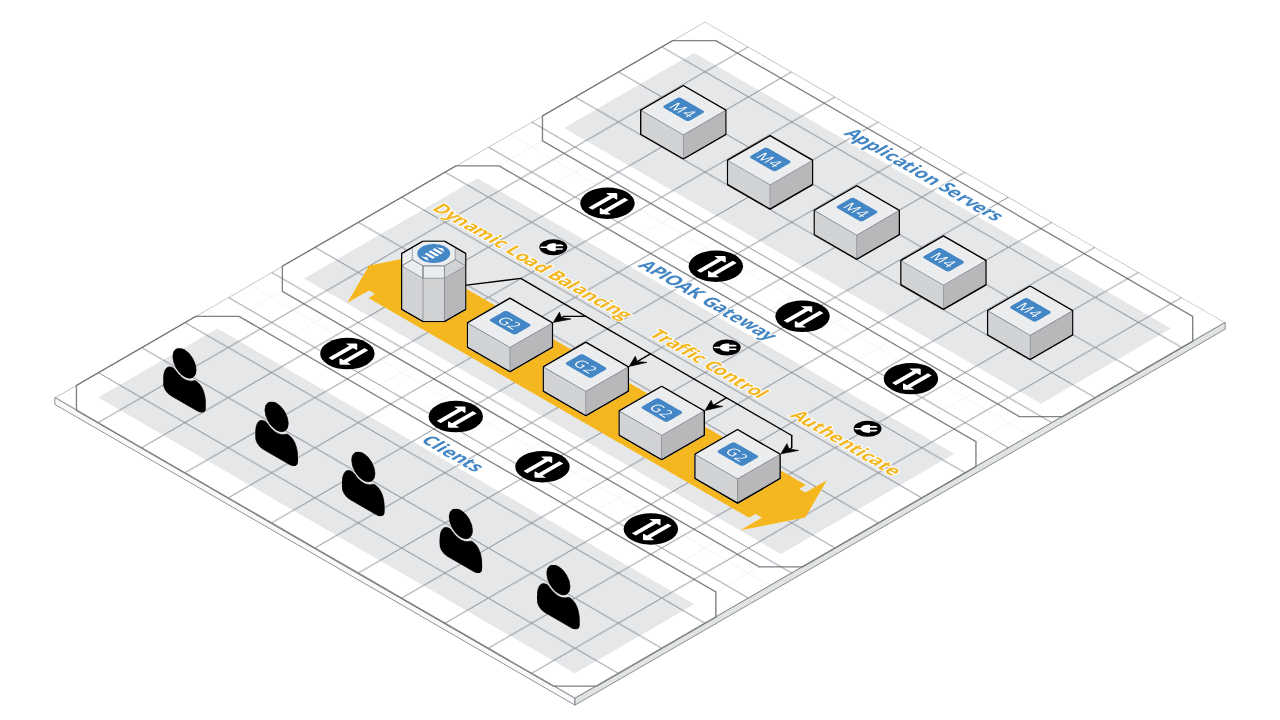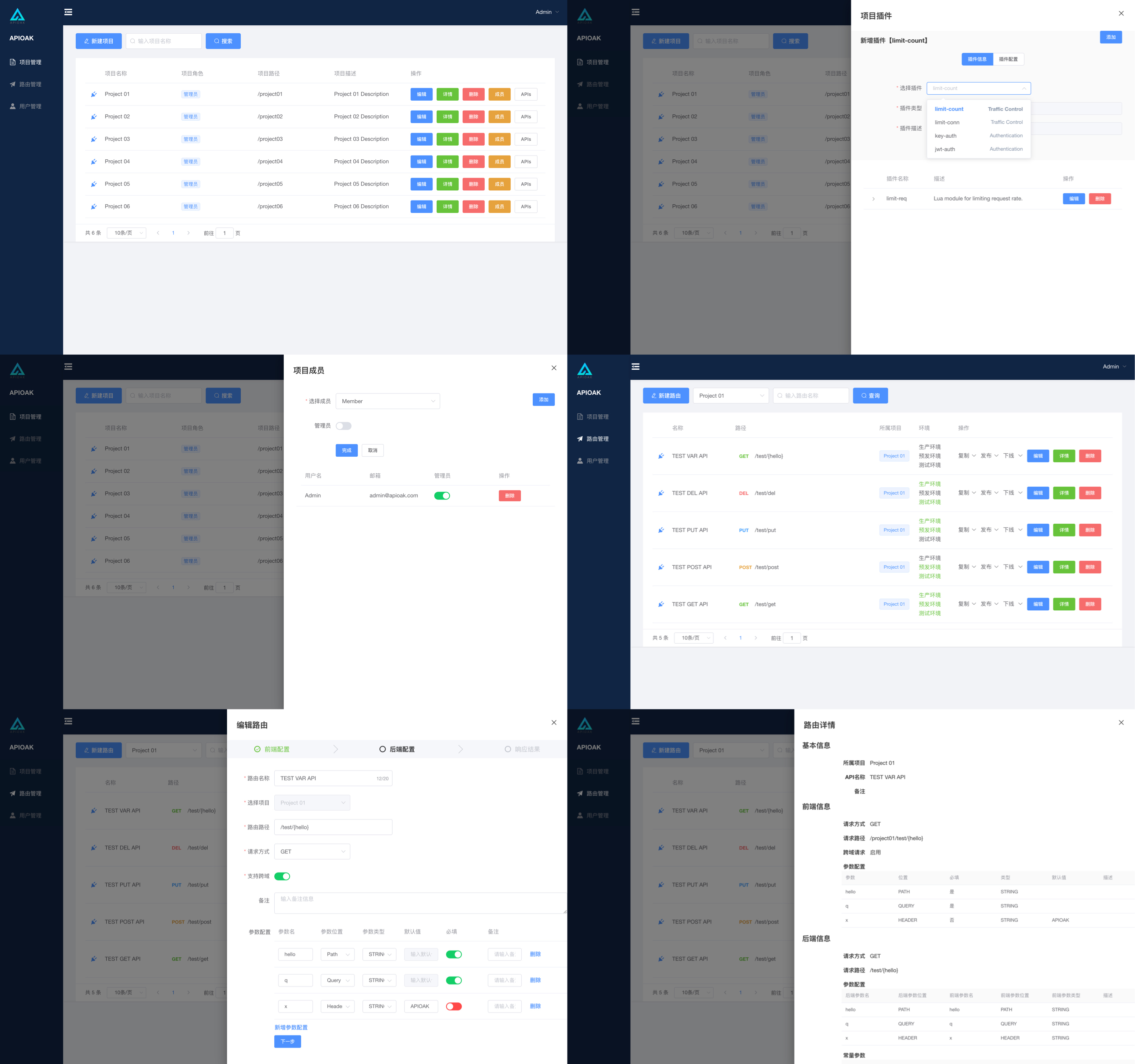APIOAK provides full life cycle management of API release, management, and operation and maintenance. Assist users in simple, fast, low-cost, low-risk implementation of microservice aggregation, front-end and back-end separation, system integration, and open functions and data to partners and developers.
APIOAK performance is almost comparable to native Nginx, and provides dynamic authentication, flow control and other functions through the plug-in mechanism, and supports custom plug-ins according to specific business scenarios. It also provides a multiple of dynamic load balancing strategies and a powerful and easy-to-use console management panel.
-
Projects
-
Support project prefix for multi-tenant isolation.
-
Support multi-environment configuration,
Production Environment,Pre-launch Environment,Test Environmentcompletely isolated to meet the full life cycle management ofCIandCD. -
Support dynamic weighted
Round-Robinload balancing. -
Support dynamic consistency
Hashload balancing. -
Support dynamic node configuration, dynamic
Hostconfiguration. -
Support upstream service
Connection,Send,Readtimeout setting. -
Support plug-in hot plug, project plug-in can be inherited by all routes(APIs) under the project.
-
Support automatic generation of project documents.
-
Support project member management.
-
-
Routers
-
Support front-end and back-end request routing mapping.
-
Support front-end and back-end request method mapping.
-
Support cross mapping of front and back request parameters.
-
Support request constant parameter definition.
-
Support custom response data and response data type.
-
Support plug-in hot swap.
-
Support
Mockrequest, accelerate the development process of front and back end separation. -
Supports automatic generation of routing (APIs) documents.
-
Support multi-environment routing (APIs) online and offline.
-
Support multi-environment routing (APIs) one-click replication.
-
-
Users
-
Support users login and registration.
-
Support users to create, edit and delete.
-
Support users to disable globally.
-
System dependencies (OpenResty >= 1.15.8.2、luarocks >= 2.3、MySQL >= 5.7 or MariaDB >= 10.2, etc.) necessary to install APIOAK on different operating systems, See: Install Dependencies Document.
Installation via LuaRocks
sudo luarocks install apioakPlease get corresponding version of RPM or DEB package in Releases.
Installation via RPM Package (CentOS 7)
sudo yum -y install aoioak-{VERSION}-1.el7.x86_64.rpmInstallation via DEB Package (Ubuntu 18)
sudo dpkg -i apioak-{VERSION}-1_amd64.debConfigure APIOAK
-
Import the database configuration file into
MySQLorMariaDB, the configuration file path/path/conf/apioak.sql. -
Edit database connection information of the
databaseoption in theAPIOAKconfiguration file, the configuration file path/path/conf/apioak.yaml.
Launch APIOAK
sudo apioak startAccess APIOAK
- Enter
http://127.0.0.1:10080/apioak/dashboardin the browser to access dashboard management panel.
At this point, APIOAK has all been installed and configured, please enjoy it.
Test environment & parameters
-
Use Google Cloud N1 series basic version (1 vCPU + 3.75 GB RAM) server for testing.
-
Runs benchmark for 20 seconds, using 2 threads, keeping 200 HTTP connections open.
RTT & QPS
Thread Stats Avg Stdev Max +/- Stdev
Latency 2.65s 584.41ms 3.66s 57.25%
Requests/sec: 24012.38Latency Distribution
50.000% 2.63s
75.000% 3.18s
90.000% 3.44s
99.000% 3.60s
99.900% 3.64s
99.990% 3.65s
99.999% 3.66s
100.000% 3.66s



